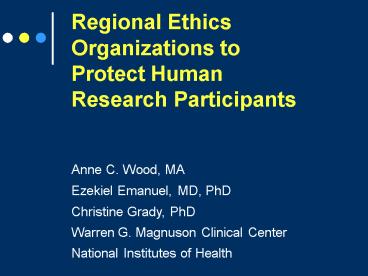Regional Ethics Organizations to Protect Human Research Participants - PowerPoint PPT Presentation
1 / 25
Title:
Regional Ethics Organizations to Protect Human Research Participants
Description:
Create Regional Ethics Organizations (REOs) in the place of local, institution-based review ... Ethics Policy Committees. Create a forum to examine major ... – PowerPoint PPT presentation
Number of Views:88
Avg rating:3.0/5.0
Title: Regional Ethics Organizations to Protect Human Research Participants
1
Regional Ethics Organizations to Protect Human
Research Participants
Anne C. Wood, MA Ezekiel Emanuel, MD,
PhD Christine Grady, PhD Warren G. Magnuson
Clinical Center National Institutes of Health
2
Disclaimer
- Does NOT represent the views of
- the National Institutes of Health,
- the Public Health Service, or
- the Department of Health
- and Human Services
3
Prevailing View
- increasing volume and research complexity and
cost are the primary threats to the systems
effectiveness. - Ellen Holt 2002
4
3 Types of Problems
- Structural Problems
- IRB Operations Problems
- Performance and Outcomes Assessment Problems
5
Structural Problems
- Not all research covered by federal regulations
- Fundamental inconsistencies in current
regulations - No mechanism for addressing major ethical issues
in research - Repetitive review
6
Structural Problems
- Inherent institutional conflicts of interest
- Inadequate education of IRB members, IRB staff,
and investigators - Inadequate resources and support for IRBs
7
IRB Operations Problems
- Review process is time-consuming
- IRBs may lack expertise in science of protocols
under review - Poor guidance on IRB operations
- Excessive focus on informed consent documents
- Inefficient and ineffective adverse event
reporting system
8
Performance and Outcomes Assessment Problems
- No systematic data collection on outcomes or
performance of the oversight system - No systematic data collection specifically on IRB
effectiveness - No systemic data collection on clinical research
9
Proposed Reforms
- Accreditation of Human Research Participant
Protection Programs - Credentialing of IRB Professionals
- Legislative Proposals
- OHRP Initiatives
- Central IRBs
- IOM Report on Oversight System
10
An Alternative Reform Proposal
- Extend federal oversight regulations to all
research - Create Regional Ethics Organizations (REOs) in
the place of local, institution-based review
11
Regional Ethics Organizations (REOs)
- Based geographically
- Number between 10-20 in the U.S
- Conduct all reviewing, monitoring, training, and
ethical policy formulation
12
Regional Ethics Organizations
Regional Ethics Organization
Protocol Review Committees
Ethics Policy Committee
Liaisons
Ombudspersons
13
Protocol Review Committees (PRCs)
- A large number of PRCs per REO
- Conduct prospective reviews of each research
study in the region - Could be based on scientific area of research
- At least 25 lay members
- Meet weekly
14
Protocol Review Committees (PRCs)
- Each research study submitted to only one REO
- Submitted to REO in the region of the principal
investigator - Approval by one REO is sufficient for all
participating sites, including sites outside that
geographic region
15
Appeals Process
- If an REO rejects a protocol, the investigator
can appeal the decision - The federal oversight body would select an
alternate REO to review the protocol
16
Performance Data
- Quarterly, each REO would report the number of
people - Approached to enroll in each study
- Enrolled in each study
- Removed from studies and why
- Who withdrew from studies
- Who had grade III and IV toxicities
- Who had serious adverse events
- Who died and why
17
Ethics Policy Committees
- Create a forum to examine major ethical issues in
research - Engage the public in thoughtful discussion of
these issues - Develop coherent and consistent policies on these
issues
18
Institutional Liaisons
- Several liaisons per REO
- Coordinate submission of protocols
- Coordinate educational programs
- Provide feedback to the REO
- Provide knowledge of local research context
19
Ombudspersons
- Several per REO
- Would serve as an advocate for research
participants - Participants could contact them with concerns
about a research study or policy
20
Education and Training in the REO System
- REOs would be responsible for education of all
REO members and all investigators in the region
21
Oversight of the REO System
- OHRP or a similar federal body would conduct
federal oversight of REOs - Coordinate REOs
- Share ethical policies
- Share best practices
- Share education programs and materials
- Collect and disseminate REO performance data
22
Objections
- REOs would lack knowledge of the local research
context - Institutions may resist adoption of REOs because
of concerns about liability
23
Cost of Current System An Estimate
- Costs dispersed throughout system, assigned to
IRBs home institutions - Between 4,000 and 6,000 IRBs
- Average expenditure of 75,000 per IRB
- Cost of current system between 300 million and
450 million per year
24
REOs on 300 Million Per Year
- Assume a system of 20 REOs
- So each REO has access to 15 million per year
- Each REO reviews 5,000 protocols per year
- So each REO spends 3,000 per protocol
25
Where Will the 300 Million Come From?
- It will be assumed by those who utilize the
system - Institutions, contract research organizations,
government, industry - May seem like a large amount, but 300 million is
about 2 of annual U.S. spending on clinical
research.































